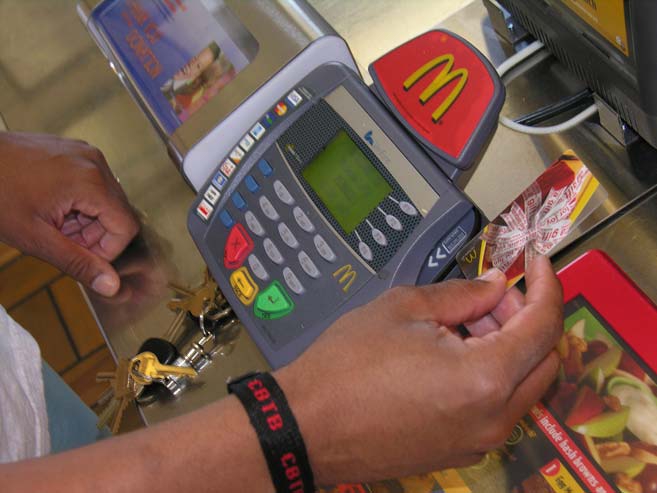
A Pennsylvania state judge has ruled that the franchisee behind 16 McDonald’s restaurants ran afoul of the state’s wage law by paying employees with debit cards.
In June 2013, Natalie Gunshannon sued the McDonald’s franchise that refused to pay her by traditional paychecks or direct deposit payroll systems and instead insisted on employees using JP Morgan Chase prepaid cards. She accused the company of earning “ill-gotten gains contrary to justice, equity, good conscience and Pennsylvania law”.
According to her lawsuit, the card imposed fees on virtually every transaction, creating a monetary and physical barrier to her hard-earned cash. $1.50 was charged for an ATM withdrawal, $5 for over-the-counter cash withdrawals and $1 to check the balance, 75 cents per online bill payment and $10 per month if the card is left inactive for more than three months. The prepaid debit cards charged a $15 replacement fee if lost or stolen.
When she asked to be paid another way, the franchise’s owners Albert and Carol Mueller told her the card was the only option. Store managers, meanwhile, were offered direct deposit forms to receive their pay without facing the card fees.
In September 2013, the director of the Consumer Financial Protection Bureau warned employers that paying workers exclusively with a debit card was not legal. The franchise owners eventually changed their payment policy but the lawsuit continued and turned into a class action suit with 2,380 members.
According to the Times-Tribune, Judge Thomas F. Burke Jr. ruled in June 2015 that the Muellers broke the law by paying thousands of employees exclusively by debit card. Burke cited the 1961 law, which mandates “wages shall be paid in lawful money of the United States or check”. He noted at least half of the states in the country allowed wages to be paid on payroll cards. However, in most of these cases, a payroll card is an option, not the exclusive method.
In May 2015, JP Morgan Chase suddenly started cutting checks to 2,380 plaintiffs. The voluntary payments from Chase ranged from as little as a penny to as high as $148. “We have decided to refund you for all fees we charged on your Chase Prepaid Card. We are sending you the attached check to refund you for these fees,” said the letter from Chase Prepaid Card Services.
West Pittston attorney Michael Cefalo, who filed the suit in June 2013 against the Muellers, questioned the timing of Chase’s surprise move (The case was certified as a class-action suit just a week earlier). “It’s like someone who robbed you and then gave you the money back when they got caught. Chase doesn’t want to be embarrassed. Chase wants this to go away,” Cefalo said.
State Rep. Gerald Mullery has introduced legislation (H.B. 1274) that would ensure employees who are paid with a debit card have access to the full amount of their wages and no-cost access to their accounts. “More employers are using debit cards instead of a check or electronic fund transfer to pay their workers. Many of these payroll debit cards are brimming with hidden fees, reducing employees’ take-home pay. That’s not right, and it must be addressed,” said Mullery, D-Newport Township.
This Article (Wage Theft: McDonald’s Violates State Law; JP Morgan Chase Issues Refunds) is free and open source. You have permission to republish this article under a Creative Commons license with attribution to the author and AnonHQ.com.




